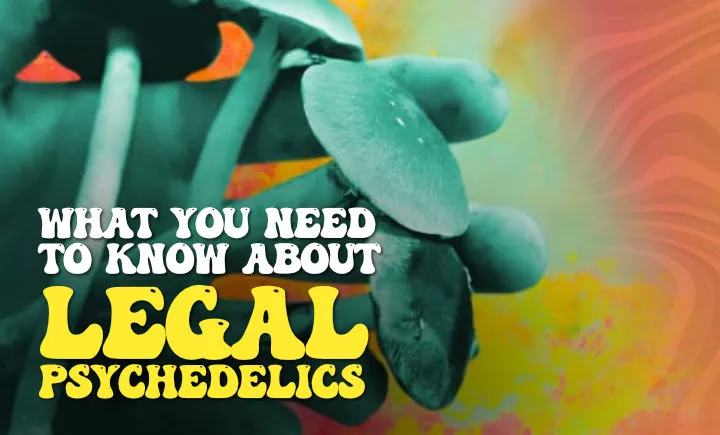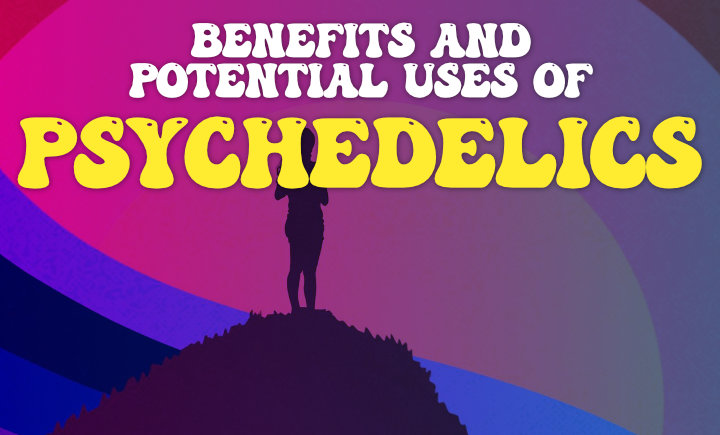
Psychedelics, also referred to as hallucinogens, are a class of substances known for inducing changes in thought processes, perceptions, and emotions. These substances have been utilized by various cultures throughout history for spiritual or therapeutic purposes.
In recent years, scientific interest has surged due to potential therapeutic applications for conditions such as depression and post-traumatic stress disorder (PTSD). Nevertheless, the legal status of psychedelics remains a contentious issue due to their psychoactive properties.
The legal landscape of psychedelics is complex and varies significantly from one region to another. While some jurisdictions have decriminalized or legalized certain psychedelics for medical or personal use, others maintain strict prohibitions against their possession and use.
What are psychedelics
Psychedelics, often referred to as hallucinogens, constitute a class of substances known for their ability to alter perception and mood.
These compounds function by interacting with serotonin receptors in the brain and can cause significant shifts in thought patterns, sensory perception, self-awareness, and emotions.
Psychedelic substances encompass a wide range of organic compounds such as psilocybin (magic mushrooms) and DMT (ayahuasca), as well as synthetic compounds like LSD (lysergic acid diethylamide).
The legal status of these substances varies significantly worldwide; however, many are categorized as Schedule I controlled substances under international law due to their high potential for abuse and lack of currently accepted medical use.
The past decade has witnessed an increasing wave of decriminalization and legalization initiatives concerning psychedelic substances globally.
This shift is largely driven by emerging scientific evidence supporting the therapeutic potential of certain psychedelics in treating various mental health conditions like depression, anxiety disorders, addiction, and post-traumatic stress disorder (PTSD).
In several states in the U.S., including Oregon and Colorado, laws have been passed to legalize or decriminalize naturally occurring psychedelics specifically.
Despite this progress towards decriminalization and legalization on a global scale, most psychedelic substances remain classified as Schedule I controlled substances in numerous countries due to concerns about safety risks associated with unsupervised use.
Legal Status of Psychedelics
The legal status of psychedelics varies greatly around the world and even within nations, with certain U.S. states spearheading movements for decriminalization and legalization.
Notably, Oregon has legalized psilocybin for therapeutic use, while cities like Denver have decriminalized it and other entheogens such as peyote and ayahuasca.
Despite a common perception of universal prohibition, numerous substances with psychedelic properties—including Salvia divinorum and certain species of Amanita mushrooms—remain legal in many jurisdictions, thereby challenging traditional views on drug policy and offering potential avenues for scientific research.
Legalization efforts
Efforts to decriminalize and legalize certain psychedelic substances have gained momentum across various U.S. states, representing a significant shift in drug policy. This has been driven, in part, by growing public interest in the potential of these substances for therapeutic use and an increasing body of scientific evidence supporting their safety and efficacy.
In this context, the Food and Drug Administration (FDA) plays a crucial role as it is responsible for regulating drugs within the country. Recently, some psychedelic substances such as psilocybin (the active ingredient in magic mushrooms) have received breakthrough therapy designation from the FDA – an acknowledgment of its potential therapeutic value based on preliminary evidence.
Concurrently with these developments at the federal level, local law enforcement agencies face novel challenges related to regulation and control. In cities like Denver and Oakland, where psychedelics have been decriminalized, police departments must navigate uncharted territories while ensuring public safety remains paramount.
Legal psychedelics
Amidst the shifting landscape of drug policy, various psychedelic substances have emerged as legally accessible options with potential therapeutic applications.
Some examples include:
– Psilocybin: A naturally occurring compound found in certain species of mushrooms, psilocybin has been decriminalized or legalized for medicinal use in a number of jurisdictions around the world. It is currently being studied for its potential to treat conditions such as depression and post-traumatic stress disorder.
– MDMA: Commonly known as ‘ecstasy ‘ or ‘molly,’ MDMA is an empathogenic drug that produces feelings of increased energy, pleasure, emotional warmth, and distorted sensory and time perception. It’s being researched extensively within the field of psychedelic medicine for its potential role in treating severe PTSD.
– LSD: Lysergic acid diethylamide (LSD) is a potent hallucinogen renowned for its powerful effects on mood, thoughts, and perception. While it remains illegal under federal law in many countries, research into LSD’s utility as part of psychedelic therapy protocols continues.

Benefits and Potential Uses of Psychedelics
The benefits and potential uses of psychedelics extend far beyond recreation; recent clinical trials suggest that legal psychedelics could play a pivotal role in the therapeutic use for a variety of mental health disorders.
The emerging field of psychedelic treatment is grounded in robust scientific research, which has begun to reveal promising results. For example, psilocybin has been used with success in treating cases resistant to conventional therapies. Other substances like ketamine have shown efficacy in rapidly reducing depressive symptoms, even among individuals with severe depression.
Furthermore, LSD microdosing is being explored for its potential benefits on creativity and cognitive flexibility while maintaining safety due to its sub-perceptual dosage level. Thus, the exploration into legal psychedelics offers an innovative angle on mental health treatments, which holds significant promise for future therapeutic approaches.
Risks and Concerns with Psychedelics
Despite the promising potential of psychedelics in various fields, including psychiatry and neuroscience, it is crucial to acknowledge their associated risks and concerns.
Adverse effects such as acute anxiety or panic, delusions, paranoia, and negative psychological impacts may arise from misuse or recreational use of these substances.
Potential adverse effects
While the therapeutic potential of legal psychedelics is undeniable, it is equally critical to consider the possible adverse effects that may accompany their use.
Research on psychedelic drugs underscores a wide range of potential adverse effects ranging from mild and transient to severe and long-lasting. These can manifest as physiological symptoms such as increased heart rate, hypertension, nausea, or seizures in extreme cases. From a psychological perspective, the use of psychedelics has been linked with acute panic reactions, hallucinations, paranoia, and even prolonged psychiatric disorders in susceptible individuals.
While these substances have shown promise in treating various mental health conditions, it is essential that any usage be carefully monitored by a qualified healthcare provider.
Precautions and safety measures
As psychedelics gain traction in both recreational use and clinical research, understanding how to minimize risks becomes increasingly important.
Notably, psilocybin mushrooms, a type of psychedelic mushroom approved for controlled use by the FDA, necessitate careful consideration given their complex pharmacological profile.
Healthcare providers and users must be aware of key measures to ensure safety while using or administering these substances.
A holistic approach encompassing pre-use screening, supervision during use, post-use support, appropriate dosing, and educating users about potential effects is crucial in reducing risks.
Comprehensive pre-use screenings can help identify individuals predisposed to adverse reactions, such as those with a history of psychosis.
Post-use support, including psychotherapy, can assist users in navigating through any emotional disturbance or psychological distress that might arise subsequent to usage.
Appropriate dosing is vital; excess dosage can lead to severe psychological effects, while suboptimal doses may yield insufficient therapeutic benefits.
Potential for misuse or recreational use
The rising popularity of substances such as psilocybin mushrooms inevitably sparks concerns about their potential for misuse or recreational use, underscoring the need for robust regulatory frameworks and public education initiatives.
Legal psychedelics like cannabis, magic mushrooms, and ketamine have distinct pharmacological properties that can lead to unique experiences in different individuals. However, these same attributes also make them susceptible to misuse, particularly when they are used without appropriate guidance or supervision.
For instance, the psychoactive compounds found in magic mushrooms can produce profound changes in perception and cognition, which, while potentially therapeutic under controlled conditions, could be disorientating or distressing if taken recreationally without preparation.
Misuse of these substances can lead to a range of adverse effects, including psychological dependence, impaired judgment leading to risky behaviors, and negative psychiatric outcomes such as psychosis or severe anxiety episodes.
Possibilities for future legalization
Future discussions on the possibility of legalizing or altering regulations surrounding psychedelics are likely to be shaped by a complex interplay of factors, such as scientific research findings, societal attitudes, and government policies.
For instance, recent ballot measures in Oregon have led to significant amendments in state laws, allowing for the regulated medical use of psilocybin. This change reflects a shift in societal attitudes towards these substances and could potentially influence future legalization efforts at both the state and federal levels. However, it is essential to note that while certain states may liberalize their stance on psychedelics based on local developments or public sentiment, changes at the federal level would require comprehensive review and consideration.
Regulation changes regarding psychedelics can also be influenced by an increased understanding of their pharmacological effects and potential therapeutic benefits. The growing body of evidence supporting the use of psychedelics for treating conditions such as depression, PTSD, and addiction has been instrumental in changing perceptions about these substances.
Conclusion
The potential benefits and applications of psychedelic substances in therapeutic settings warrant further investigation. A more nuanced approach to their legal status may open new avenues for research and treatment options. However, it is essential that any changes in policy are underpinned by rigorous scientific evidence to ensure safety.
Furthermore, while promising possibilities exist, caution must be exercised due to the inherent risks associated with these substances. Continuous monitoring and regulation should accompany any future legalization or decriminalization efforts to mitigate potential misuse and adverse effects.
Frequently Asked Questions
Are legal psychedelics safe to use?
Legal psychedelics, when used responsibly and in controlled environments, are generally considered safe. However, individual reactions and experiences can vary, so it’s important to educate yourself, follow dosage guidelines, and be mindful of your mental and physical well-being.
How do legal psychedelics differ from illegal ones?
Legal psychedelics typically refer to substances that are not classified as controlled substances by the government. They may have similar effects to illegal psychedelics, but they are often derived from natural sources or have been modified chemically to create a legal alternative.
Can legal psychedelics be addictive?
Legal psychedelics are generally not considered addictive in the same way as substances like opioids or stimulants. However, like any psychoactive substance, they can be habit-forming if used excessively or as an unhealthy coping mechanism. Responsible use and moderation are crucial.
Where can I legally obtain psychedelics?
The availability of legal psychedelics varies by country and jurisdiction. Some legal psychedelics can be purchased online, while others may require a prescription or be limited to specific therapeutic settings. It’s important to research and comply with the regulations in your area.

